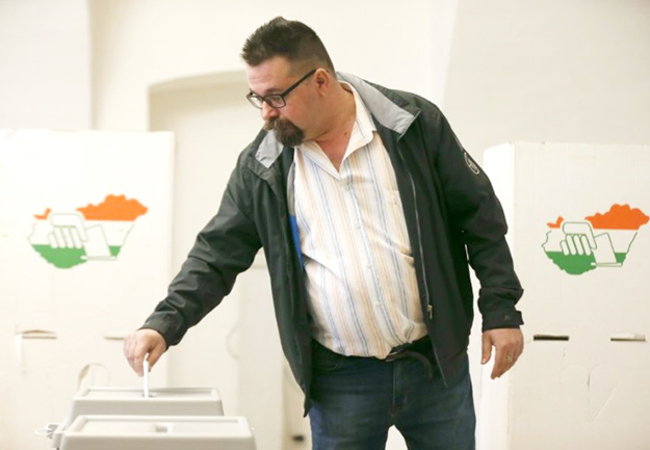Hungary's Orban seeks third term in keenly-watched poll
Apr 08, 2018
Orban himself voted early on Sunday morning with his wife at a school in the leafy Zugliget suburb of Budapest

PIC: Orban and his wife Aniko Levai voted at a polling station in a school in a Budapest suburb. (Credit: AFP)
VOTE | POLITICS
HUNGARY - Hungarians are voting Sunday in an election that is being keenly observed across Europe, and which will determine whether firebrand nationalist Prime Minister Viktor Orban wins an expected third consecutive term.
Orban has clashed with EU institutions over his moves to clamp down on civil society and his fiery anti-immigration rhetoric, but he has drawn plaudits from other nationalist politicians and those on the far-right who look to him as an inspiration.
Opinion polls have consistently put Orban and his right-wing Fidesz party 20 or more points clear of their nearest rivals, Jobbik, a far-right party that has been moving towards the centre, and the centre-left Socialists.
A mainly first-past-the-post election system designed by Fidesz gives it an edge over a divided opposition, but early figures suggest turnout may be higher than in 2014, which analysts say could harm Fidesz.
Around 7.9 million Hungarians are eligible to vote until polls close at 7:00pm (1700 GMT) local time.
'No migrants'
Orban himself voted early on Sunday morning with his wife at a school in the leafy Zugliget suburb of Budapest.
"This is a country which has always stepped up for itself, so we can trust in the people, I will accept their decision," he said.
Also casting her vote at the school, pensioner Ilona Gubacsi said she hoped the result would mean "no migrants coming to Hungary and for things to remain as they are".
Meanwhile Jobbik leader Gabor Vona cast his vote in the north-eastern town of Gyongyos, urging voters to turn out and saying that the result would "determine the fate of Hungary not just for four years but... for two generations".
Voting at the same polling station, kindergarten nurse Szilvia Nagy said: "I would like to change the government, because I desire a nicer future."

Leader of the Jobbik party, Gabor Vona, and his wife Krisztina cast their ballots in the town of Gyoengyoes
Lurid rhetoric
Preliminary results are expected one or two hours after polls close, with broader trends expected to become clear only slowly over the course of the evening.
Even if Fidesz does gain its expected parliamentary majority, analysts will be watching to see whether it falls short of the two-thirds "supermajority" that has enabled it to pass some of its most controversial bills.
These include some of the measures that have put Orban on a collision course with Brussels, such as eroding the independence of the media and the judiciary, as well as its crackdown on civil society groups, particularly those funded by Hungarian-born US billionaire George Soros.
The government has been accused by critics of using anti-Semitic stereotypes in its relentless campaign against Soros, who is Jewish.
Orban accuses Soros and the organisations he funds of promoting mass Muslim and African immigration into Europe in order to undermine its Christian identity.
Orban's sometimes lurid rhetoric against immigrants resulted in February in a spat between the government and the UN's top human rights official, Zeid Ra'ad Al Hussein, who accused Orban of xenophobia and racism.
Although Orban's actions, including refusing to participate in the EU's refugee resettlement scheme, have sometimes annoyed other European governments, Fidesz is afforded a measure of protection by virtue of its membership of the main centre-right EPP grouping in the European Parliament.
Senior EPP leaders have themselves courted controversy by wishing Orban luck ahead of the poll.
On a visit to Budapest Friday, Jaroslaw Kaczynski, leader of Poland's governing PiS party, also gave Orban his endorsement.

The government has Hungary's solid economic growth would be at risk in the event of an opposition victory
Poland's government has had its own run-ins with Brussels over its changes to the judicial system, and sees Hungary as an important ally within the EU.
A strong showing for Orban will be welcomed by admirers on the far-right in Europe, such as France's Marine Le Pen, and beyond.
Orban has also cultivated Russian President Vladimir Putin as an ally and has previously cited Russia as an example of the sort of "illiberal state" he hopes to anchor in Hungary.
Corruption allegations
At a local mayoral by-election in February, Fidesz suffered a shock defeat after the opposition threw its weight behind a single candidate, prompting a surge in turnout.
Opposition parties have not coordinated this closely on a national level, but tactical voting could nevertheless represent a danger to Fidesz in 30-40 "swing seats".
The last few weeks of the campaign have been marked by allegations of money laundering and corruption levelled at Orban's inner circle, often published in media owned by oligarch Lajos Simicska, an erstwhile Orban ally who fell out with him after Fidesz's 2014 election victory.
Orban has avoided public debates with opponents or speaking to independent media, preferring instead to address supporters at carefully stage-managed events where he has hammered home his anti-immigration message.
The government also points to Hungary's solid economic growth, which has brought steadily rising wages, and says this would be at risk in the event of an opposition victory.
AFP
